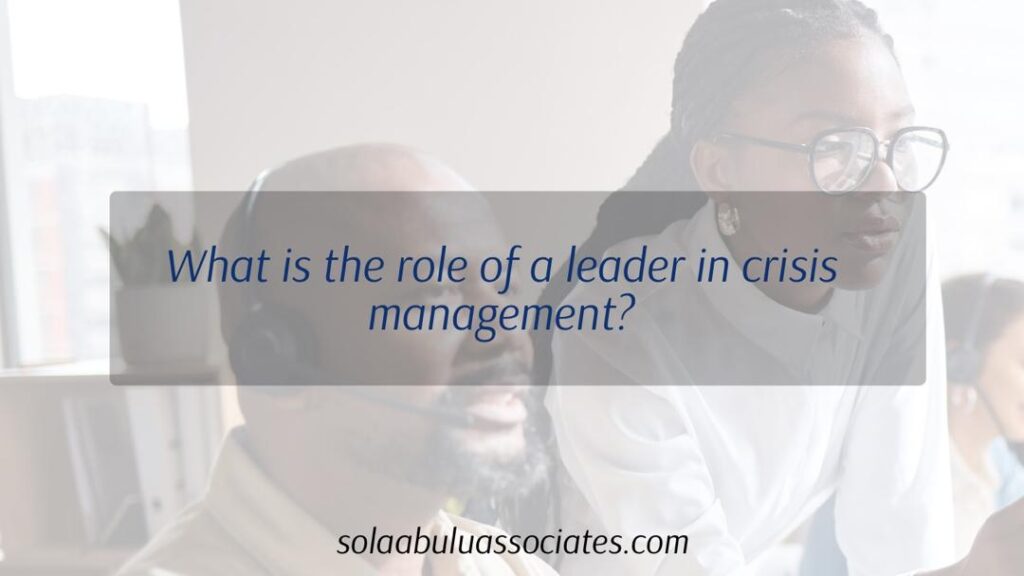What is the role of leadership in crisis management?

The role of leaders in crisis management is important in moving through a crisis. The presence or absence of effective communication leaders contributes to the outcome achieved and the ability of the organization, business or entity to retain a positive public perception in the aftermath. Both business, organizational, institutional or government leaders and communications leaders need to work in sync to proactively create a messaging that effectively de-escalates negative sentiments. In Nigeria, for example, the flood incidents report of 2023 was a major national crisis that gave rise to the loss and displacement of many lives and properties.
In Sola Abulu’s perspective on the flooding incident, she explained that “the role of a crisis leader is poorly understood or appreciated by those in authority. There is no apparent commitment or readiness to learn or function in this capacity. (unless it is a political crisis)”. Therefore, this article will explore leadership communication in a crisis management scenario.
Who is a communications leader?
A communications leader is saddled with the responsibility of leading and managing an active communications team. It is often one who has knowledge of best practices in handling communications for businesses, organizations, institutions and any given entity. A communications leader must have the ability to listen properly and derive clear messaging that addresses audience concerns. Communication without listening is self-talk. Sola Abulu stated that:
“Communication always involves someone other than the self. It is the existence of an “other” that gives communication life – or a reason to exist. For that reason, listening is an important pre-requisite for communications.”
This means that whoever leads a crisis communication team must understand the importance of listening before crafting a message that is relevant in addressing the negative sentiments circulating in the media.
A highly effective communications leader achieves the following in a crisis situation:
- Restore normalcy: The goal of any crisis communication effort is to make things better. This means that the leader who is in charge of shaping this narrative understands this goal and is very targeted in messaging to see that alongside a quick de-escalation of the negative sentiment, the public’s trust in the brand is strengthened and made even better.
- Takes responsibility for the situation: Rather than throw blames on team members when addressing the public through press releases and interviews, a good and effective communications leader will take responsibility and help the audience see his or her willingness in correcting the operational processes that could have resulted in the crisis. This requires an “enterprise first” mindset where everyone works for the common good of the entity involved.
- Listen and take action: As already stated above, listening is a very important skill for communications professionals and leaders. In addressing sentiments, the responses must not be carelessly drafted or sorely to defend but should communicate a feeling of care and concern to the aggrieved stakeholders. The willingness to take action must be very visible and clear to all.
- Effective leaders help manage the internal stakeholders during a crisis and help team members bring their best selves to contribute to the business or organization’s growth regardless of the challenging situations that may be demotivating. You will find this article very insightful.
Whether in a crisis scenario or not, the role of a leader is very important to the growth of any business, organization, institution, brand or entity.
Our upcoming Issues, Crisis and Reputation Management course is curated to help you understand the dynamics of crisis management and learn how to build resilience in your team and organization. This is a highly recommended course for business/organizational and communications leaders. You can sign up and register here to join the 2nd Cohort this October.
Early bird registration discounts are ongoing until the 2nd week of October. Enrollment closes on October 29, 2024 at midnight West Africa Time.
…………………………………………………………………
Sola Abulu & Associates (SA&A) is a strategy and communications training and consulting firm focused on enabling businesses and organizations to achieve their desired objectives through ethical and strategic communications, organizational effectiveness and reputation management.
